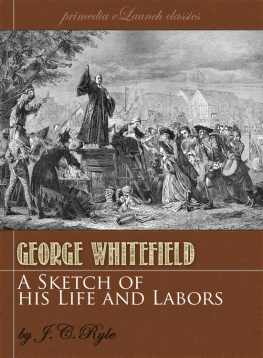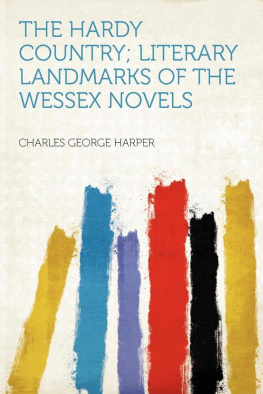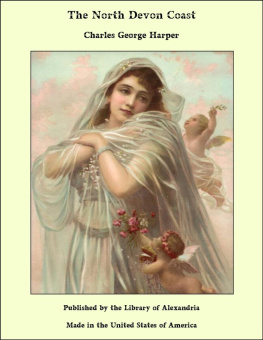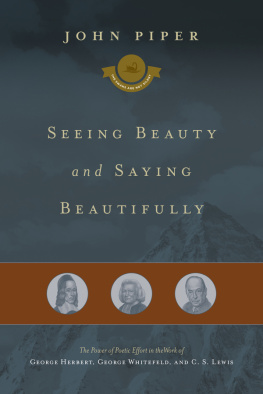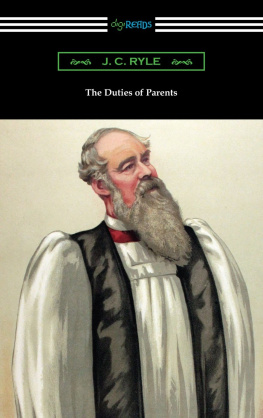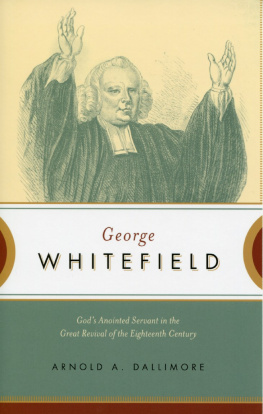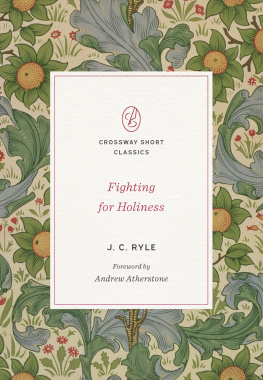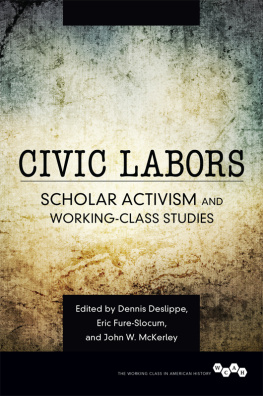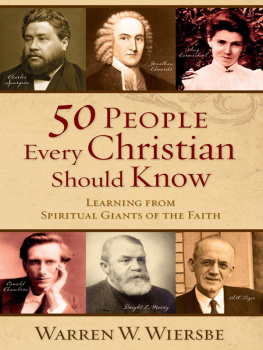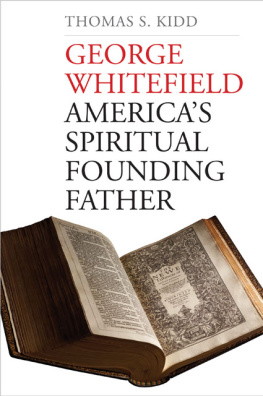John Charles Ryle - A Sketch of the Life and Labors of George Whitefield
Here you can read online John Charles Ryle - A Sketch of the Life and Labors of George Whitefield full text of the book (entire story) in english for free. Download pdf and epub, get meaning, cover and reviews about this ebook. year: 2010, publisher: Project Gutenberg, genre: Religion. Description of the work, (preface) as well as reviews are available. Best literature library LitArk.com created for fans of good reading and offers a wide selection of genres:
Romance novel
Science fiction
Adventure
Detective
Science
History
Home and family
Prose
Art
Politics
Computer
Non-fiction
Religion
Business
Children
Humor
Choose a favorite category and find really read worthwhile books. Enjoy immersion in the world of imagination, feel the emotions of the characters or learn something new for yourself, make an fascinating discovery.
- Book:A Sketch of the Life and Labors of George Whitefield
- Author:
- Publisher:Project Gutenberg
- Genre:
- Year:2010
- Rating:3 / 5
- Favourites:Add to favourites
- Your mark:
- 60
- 1
- 2
- 3
- 4
- 5
A Sketch of the Life and Labors of George Whitefield: summary, description and annotation
We offer to read an annotation, description, summary or preface (depends on what the author of the book "A Sketch of the Life and Labors of George Whitefield" wrote himself). If you haven't found the necessary information about the book — write in the comments, we will try to find it.
A Sketch of the Life and Labors of George Whitefield — read online for free the complete book (whole text) full work
Below is the text of the book, divided by pages. System saving the place of the last page read, allows you to conveniently read the book "A Sketch of the Life and Labors of George Whitefield" online for free, without having to search again every time where you left off. Put a bookmark, and you can go to the page where you finished reading at any time.
Font size:
Interval:
Bookmark:
A SKETCH
OF THE
LIFE AND LABORS
OF
GEORGE WHITEFIELD.
BY THE
REV. J. C. RYLE, B.A.,
Author of "A Call to Prayer,""Living or Dead," "Wheat and Chaff," "The Cross,"&c.
NEW-YORK:
ANSON D. F. RANDOLPH, 683 BROADWAY
1854.
There are some men in thepages of history, whose greatness no person of common sense thinks ofdisputing. They tower above the herd of mankind, like the Pyramids, theParthenon, and the Colosseum, among buildings. Such men were Luther andAugustine, Gustavus Adolphus and George Washington, Columbus and Sir IsaacNewton. He who questions their greatness must be content to bethought very ignorant, very prejudiced, or very eccentric. Public opinion hascome to a conclusion about themthey were great men.
But there are also great menwhose reputation lies buried under a heap of contemporary ill-will andmisrepresentation. The world does not appreciate them, because the world doesnot know their real worth. Their characters have come down to us through poisonedchannels. Their portraits have been drawn by the ill-natured hand of enemies.Their faults have been exaggerated. Their excellences have been maliciouslykept back and suppressed. Like the famous sculptures of Nineveh, they need thehand of some literary Layard to clear away the rubbish that has accumulatedround their names, and show them to the world in their fair proportions. Suchmen were Vigilantius and Wickliffe. Such men were Oliver Cromwell and many ofthe Puritans. And such a man was George Whitefield.
There are few men whosecharacters have suffered so much from ignorance and misrepresentation of thetruth as Whitefield's.
That he was a famousMethodist, and ally of John Wesley, in the last century; that he was much runafter by ignorant people, for his preaching; that many thought him anenthusiast and fanatic; all this is about as much as most Englishmen know.
But that he was one of theprincipal champions of evangelical religion in the eighteenth century in ourown country; that he was one of the most powerful and effective preachers thatever lived; that he was a man of extraordinary singleness of eye, anddevotedness to the interests of true religion; that he was a regularly ordainedclergyman of the Church of England, and would always have worked in the Church,if the Church had not, most unwisely, shut him out; all these are things, ofwhich few people seem aware. And yet, after calm examination of his life andwritings, I am satisfied this is the true account that ought to be given ofGeorge Whitefield.
My chief desire is to assistin forming a just estimate of Whitefield's worth. I wish to lend a helping handtowards raising his name from the undeservedly low place which is commonlyassigned to it. I wish to place him before your eyes as a noble specimen ofwhat the grace of God can enable one man to do. I want you to treasure up hisname in your memories, as one of the brightest in that company of departedsaints who were, in their day, patterns of good works, and of whom the world wasnot worthy.
I propose, therefore,without further preface, to give you a hasty sketch of Whitefield's times,Whitefield's life, Whitefield's religion, Whitefield's preaching,and Whitefield's actual work on earth.
The story of Whitefield'stimes is one that should often be told. Without it, no body is qualified toform an opinion either as to the man or his acts. Conduct that in one kind oftimes may seem rash, extravagant, and indiscreet, in another may be wise,prudent, and even absolutely necessary. In forming your opinion of thecomparative merits of Christian men, never forget the old rule:"Distinguish between times." Place yourself in each man's position.Do not judge what was a right course of action in other times, by what seems aright course of action in your own.
Now, the times whenWhitefield lived were, unquestionably, the worst times that have ever beenknown in this country, since the Protestant Reformation. There never was agreater mistake than to talk of "the good old times." The times ofthe eighteenth century, at any rate, were "bad old times,"unmistakably. Whitefield was born in 1714. He died in 1770. It is not sayingtoo much to assert, that this was precisely the darkest age that England haspassed through in the last three hundred years. Anything more deplorable thanthe condition of the country, as to religion, morality, and high principle,from 1700 to about the era of the French Revolution, it is very difficult toconceive.
The state of religion in theEstablished Church can only be compared to that of a frozen or palsied carcass. There werethe time-honored formularies which the wisdom of the Reformers had provided. There werethe services and lessons from Scripture, just in the same order as we havethem now. But, as to preaching the gospel in the Established Church, there wasalmost none. The distinguishing doctrines of Christianitythe atonement, thework and office of Christ and the Spiritwere comparatively lost sight of. Thevast majority of sermons were miserable moral essays, utterly devoid of anything calculated to awaken, convert, save, or sanctify souls. The curse ofblack Bartholomew-day seemed to rest upon our Church. For at least a centuryafter casting out two thousand of the best ministers in England, ourEstablishment never prospered.
There were some learned andconscientious bishops at this era, beyond question. Such men were Secker, andGibson, and Lowth, and Warburton, and Butler, and Horne. But even the best of themsadly misunderstood the requirements of the day they lived in. They spent theirstrength in writing apologies for Christianity, and contending againstinfidels. They could not see that, without the direct preaching of theessential doctrines of Christ's gospel, their labors were all in vain. And, asto the majority of the bishops, they were potent for negative evil, butimpotent for positive good; giants at stopping what they thought disorder, butinfants at devising anything to promote real order; mighty to repressover-zealous attempts at evangelization, but weak to put in action any remedyfor the evils of the age; eagle-eyed at detecting any unhappy wight who trod onthe toes of a rubric or canon, but blind as bats to the flood of indolence andfalse doctrine with which their dioceses were everywhere deluged.
That there were manywell-read, respectable and honorable men among the parochial clergy at thisperiod, it would be wrong to deny. But few, it is to be feared, out of thewhole number, preached Christ crucified in simplicity and sincerity. Many whoselives were decent and moral, were notoriously Arians, if not Socinians. Manywere totally engrossed in secular pursuits; they neither did good themselves,nor liked anyone else to do it for them. They hunted; they shot; they drank;they swore; they fiddled; they farmed; they toasted Church and King, andthought little or nothing about saving souls. And as for the man who dared topreach the doctrine of the Bible, the Articles, and the Homilies, he was sureto be set down as an enthusiast and fanatic.
The state of religion amongthe Dissenters was only a few degrees better than the state of the Church. Thetoleration which they enjoyed from William the Third's time was certainlyproductive of a very bad spiritual effect on them as a body. As soon as theyceased to be persecuted, they appear to have gone to sleep. The Baptist andIndependent could still point to Gill, and Guyse, and Doddridge, and Watts, anda few more like-minded men. But the English Presbyterians were fast lapsinginto Socinianism. And as to the great majority of nonconformists, it is vain todeny that they were very different men from Baxter, and Flavel, and Gurnall,and Traill. A generation of preachers arose who were very orthodox, butpainfully cold; very conscientious, but very wanting in spirituality; veryconstant in their objections to the Established Church, but very careless aboutspreading vital Christianity.
Next pageFont size:
Interval:
Bookmark:
Similar books «A Sketch of the Life and Labors of George Whitefield»
Look at similar books to A Sketch of the Life and Labors of George Whitefield. We have selected literature similar in name and meaning in the hope of providing readers with more options to find new, interesting, not yet read works.
Discussion, reviews of the book A Sketch of the Life and Labors of George Whitefield and just readers' own opinions. Leave your comments, write what you think about the work, its meaning or the main characters. Specify what exactly you liked and what you didn't like, and why you think so.

